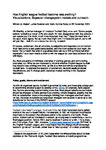Has English league football become less exciting?
| dc.contributor.author | Eales, John | |
| dc.contributor.author | Stander, Julian | |
| dc.contributor.author | Corina Borja, M | |
| dc.date.accessioned | 2021-08-04T11:08:48Z | |
| dc.date.issued | 2020-11-26 | |
| dc.identifier.issn | 1740-9705 | |
| dc.identifier.uri | http://hdl.handle.net/10026.1/17389 | |
| dc.description.abstract |
Bill Shankly, a former manager of Liverpool Football Club, once said: “Some people believe football is a matter of life and death. I'm very disappointed with that attitude. I can assure you it is much, much more important than that.” Many die-hard fans of the sport would agree. But as much they might love “the beautiful game”, some will tell you that… well, it’s not always that exciting to watch. Of course, excitement, like all emotions, is subjective and depends a lot on context. Most fans come to see goals being scored, and the more scored by your team, the better. But a match that ends in a goalless draw can be a thrill-a-minute nail-biter, especially if your team needs a draw to win the league but your best defender is out with injury. So, there are plenty of individual examples of exciting games, and some boring examples, too. What we are interested to know is whether English league football has become less exciting over time, as this is a view sometimes expressed by football fans. To address the question of excitement, we build easily produced visualizations, and fit change-point statistical models working in the Bayesian framework. | |
| dc.language.iso | en | |
| dc.publisher | Royal Statistical Society | |
| dc.title | Has English league football become less exciting? | |
| dc.type | journal-article | |
| plymouth.publisher-url | https://www.significancemagazine.com/sports/693-has-english-league-football-become-less-exciting | |
| plymouth.journal | Significance: statistics making sense | |
| plymouth.organisational-group | /Plymouth | |
| plymouth.organisational-group | /Plymouth/Admin Group - REF | |
| plymouth.organisational-group | /Plymouth/Admin Group - REF/REF Admin Group - FoSE | |
| plymouth.organisational-group | /Plymouth/Faculty of Science and Engineering | |
| plymouth.organisational-group | /Plymouth/REF 2021 Researchers by UoA | |
| plymouth.organisational-group | /Plymouth/REF 2021 Researchers by UoA/EXTENDED UoA 10 - Mathematical Sciences | |
| plymouth.organisational-group | /Plymouth/REF 2021 Researchers by UoA/UoA10 Mathematical Sciences | |
| plymouth.organisational-group | /Plymouth/Users by role | |
| plymouth.organisational-group | /Plymouth/Users by role/Academics | |
| dcterms.dateAccepted | 2020-11-25 | |
| dc.rights.embargodate | 2021-8-7 | |
| dc.rights.embargoperiod | Not known | |
| rioxxterms.licenseref.uri | http://www.rioxx.net/licenses/all-rights-reserved | |
| rioxxterms.licenseref.startdate | 2020-11-26 | |
| rioxxterms.type | Journal Article/Review |


